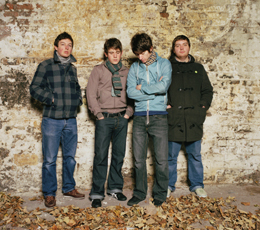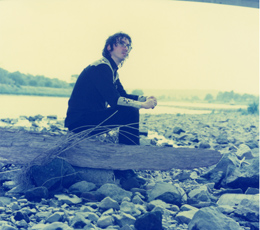

(Arctic Monkeys vs Scritti Politti)
Nationwide Mercury Music Prize 2006


(Arctic Monkeys vs Scritti Politti)
Nationwide Mercury Music Prize 2006
On the eve of the Nationwide Mercury Music Prize winner being announced Designer Magazine brings you an exclusive interview with the prize's Director Kevin Milburn. Prior to being involved with the Prize he started off writing reviews for Manchester University Newspaper before getting involved in music PR and sub-editing trade magazines.
Below he explains how the Mercury Music Prize comes together, the myths and fallacies behind the prize and why he's personally backing a virtual unknown to the younger generation of music fans above the likes of Arctic Monkeys and Thom Yorke of Radiohead. There's also the tantalizing tease that in a number of years we could see the Unsigned Nationwide Mercury Music Prize
Q: What does the Director of the Nationwide Mercury
Music Prize do?
A: Essentially bits of everything. Obviously we just
had the shortlist announced a few weeks ago so the whole production side
goes into that. There's a team of four of us here who all share the tasks
out, but essentially there's the launch of the 12 albums, the production
of the main show on September 5th and before that working out way back
there's the actual getting the albums in from all the record companies,
appointing the judges, having the meetings leading up to the shortlist
being announced and once the shortlist is announced there's the media side
of things, the retail campaign with the record companies and your HMVs
and Virgin getting behind the 12 titles.
And when we're not doing that during the winter months
we do an art competition for students which is run with all of the university's
and art colleges and encourages artists to come up with a painting or sculpture
inspired by the theme of music. Of the 50 finalists from that we set up
an exhibition in London so it's pretty good fun doing that as well.
Q: And what did you do before you got involved in the
Mercury?
A: I did a bit of subbing on the music trade mags. I
worked on a music industry exhibition and conference that ran for about
6 months or so doing marketing and PR on that. Before that I did a Media
Culture Masters and specialized on "The Political Economy & Aesthetics
Of Popular Music" and did a dissertation on David Sylvian of Japan. That
was post-grad and before that I did a load of music reviews for University
of Manchester newspaper. I've always been involved in music it must be
said.
Q: The thing about the Mercury Music Prize is that
the judges have always been shrouded in secrecy haven't they?
A: (Laughs) I'm not so sure about secrecy. We tend to
keep it fairly quiet before the actual announcement is actually made because
we don't want them being hassled by labels and media asking who they like
and all the rest of it. But it's on the compilation CD we put out and we
announce them at the show which is on BBC4 on the night with highlights
on BBC2. So it's not so much secrecy - we just don't tell people
at the exact time they'd perhaps like to know. A lot of them do interviews
on our behalf, like Lauren Laverne from XFM.
Q: How do you decide who is on the judging panel each
year?
A: We usually keep some of the judges from year to year
for some continuity in the process. But essentially we tend to get people
on there that listen to a wide range of different music, that are very
open and receptive to a whole range of styles. They can't have direct involvement
in the records so it can't be anybody from retailers, record companies
or music publishers.
It's different people who have different tastes / different
backgrounds so there will be some who are more into indie, some who are
more into folk and jazz. It tends to be a good spread on there and we tend
to make it not too London centric so we have people from the Glasgow Herald,
a guy called Dean Jackson who does a really good show for BBC Nottingham,
people involved in music teaching and academia and then we have some execs
from Radio 1.
Q: Looking at this years shortlist of albums would
you say it's more streamlined, more NME friendly list for the indie kids
with the likes of Arctic Monkeys, Muse, Thom Yorke, Editors, Guillemots,
Lou Rhodes?
A: I'm not sure about Lou Rhodes. I'm sure Lou would
love to be in NME to be honest. I think different people interpret the
list in different ways. To be honest the criticism we've had this year
is the opposite, that there aren't enough bigger names that are known to
NME readers and we've gone for the Zoe Rahman's, Lou Rhodes and Scritti
Politti's and so on. Perhaps slightly lesser known artists compared to
some of those bigger bands that are playing all the festivals.
Last year certainly it was, to use a phrase, NME friendly when you had about 5 or 6 indie bands in there when you has Magic Numbers, Hard Fi, Bloc Party and Kaiser Chiefs. It was a really strong year for indie guitar last year and I think this year it's slightly more singer-songwriter based if anything. Isobelle Campbell, Richard Hawley and Thom Yorke.
I think it's quite fun to have a slightly different flavour to the list each year. I think if it was of a type each year then it would lose some of it's appeal and element of surprise and so on.
As long as it gets people talking about not just what
is on the list, but what isn't on there it can only be doing a good thing
cos essentially we're trying raise the profile of music itself as much
as anything, because obviously there's increasing competition from DVDs,
games and so on, so I think as long as people are saying why is that one
there and not this one at least people are engaging with it and talking
about music and the albums. That's what it's all about - from beginning
to end do these actually work as complete albums and the album as an artform.
Q: How many albums is the shortlist whittled down from?
A: It's was just about 200 this year. A few more than
the normal. I think at this stage last year Antony & The Johnsons was
relatively unknown so I think the fact that he went on to win it probably
encouraged a few people from that type of music to have a punt. And also
Seth Lakeman did very well out of the process last year as well.
I just think in terms of how the industry's working as
well. It's becoming much more straightforward for people to record relatively
cost efficiently these days and to actually get albums out there compared
to how it was 5 or 6 years ago.
Q: How do you feel the prize is relevant to one-off
download singles and Ipod Shuffles. Younger people don't necessarily listen
to an album from beginning to end anymore?
A: I don't know because album sales still seem to be
going pretty well despite all that. I think what is actually coming out
of that is increasing people are discovering tracks, but then there discovering
tracks and wanting to know more about those people that have done those
tracks. People might come across Joy Division for the first time on an
MP3 that someone's sent over to them and I think people are finding out
for themselves a lot more about these artists and becoming a lot more curious
about what's out there. People not being dictated by quite so much about
what certain gatekeepers might want them to listen to.
There's so much music out there. I think A) It's increasing their curiosity and B) Something like the Nationwide Mercury Music Prize is quite helpful in that respect because people are spoilt for choice right now so anything that provides a list and provides some guidance and assistance. People walk into record shops right now and are bombarded by so much stuff and the list takes an overview of the previous 12 months and isn't hung up on midweek's or what's come out in the last 6 weeks. So we can go here's this record by Richard Hawley that came out last September, you may have missed it when it came out, but give it a go cos it's really good stuff and it may not have been picked up by radio.
So people might download a couple of tracks by Richard
Hawley or Scritti Politti, like it and then going out and buying a full
album. Whereas before perhaps some of those artists if there wasn't a single
around people wouldn't have actually been willing to take that chance of
that album because of the price of an album.
Q: We had a debate on message board recently about
music have become devalued in comparison to other things. Previous generations
would literally save dinner money or pocket money up for an album, whereas
now kids will download music for free but think nothing of spending £20
for a belt instead of a CD?
A: I think that's a separate discussion, but yeah I think
that is a problem. I think in terms of what we have here they are slightly
more grown up records if you want to put it like that. I think they are
records that people would want to own the album with beautiful artwork
and a lot of effort that has gone into these recordings. It's really shows
as the saying goes that it's not just a couple of singles and a lot of
filler, these are really good records from beginning to end.
I think if you are giving people, it's a horrible phrase, but a decent product, then they will be willing to pay. In the past there has been an attempt to fob people off with 2 or 3 songs and rush things out. If you do that obviously it does devalue it and mark down the price and so on. These one's though - they're well worth a tenner of anybody's money!


(Richard Hawley and Lou Rhodes)
Q: Going on to the recent Independent article on "The
Curse Of The Mercury Music Prize"?
A: (laughs) We've had two or three in the Independent.
We had a couple a fortnight before praising us because one of our judges
works for the Independent and I think the Curse Of The Mercury was trying
to balance out their editorial stance. I went into XFM recently and did
some interviews with them and talked about how this so called curse has
been lifted with bands like Franz Ferdinand who have done pretty well since
they won and Antony & The Johnsons recently headlined the Latitude
Festival. And people like Primal Scream, Suede and Pulp and so on it didn't
seem to do them much harm.
It's one of those tricky ones isn't it? All were saying is that these artists have made a great record, if they then go on to make subsequent great records then brilliant but perhaps this may be the best album that that artist ever does. It's the same with the Booker or the Turner. We're not clairvoyants and we're not saying this is an album to watch for the next 25 years. We're just saying here is an album and our judges think it's really good and we'd recommend you listen to it.
Certainly anyone who's ever won is still making music.
Invariably they're doing music that might be slightly hidden from the mainstream
view. People like Talvin Singh are still doing interesting creative work,
but someone like Talvin was never going to command a huge mass audience.
There's no reason for that artist not to win a prize such as this because
we're just judging the music not the sales.
Q: Is there anyone over the years that have been nominated
by the judges that you've thought shouldn't be in there?
A: Erm.....yes. But I think that's the whole joy of it
really. You look at lists such as this and again i'd widen it out to the
likes of the Booker, Turner, Whitbread, Grammys and you think why is my
particular favourite not in there. I think that the ones that have come
up on the whole have been pretty stimulating. You can usually see why albums
are on there and sometimes you can respect an album on there even though
it isn't to your particular taste.
Q: What's the tension like on the night itself trying
to pick the final album?
A: On the night there is, much more so than on the shortlist
because it's a fairly reductive process and you're doing down from 12 albums
to 1. That does get quite fraught, but at least it shows that people care
and they're suitably passionate about the different records. It's always
really hard to pick one overall winner. I mean we promote all 12 as the
albums of the year and then there is one overall winner but in a sense
there like Man Of The Match or Woman Of The Match because we don't see
them as nominees - we do see them as albums of the year.
Q: You do get the impression that is swings from one
direction to it's opposite so with that in mind it does seem that the Arctic
Monkeys this year is the opposite of Antony & The Johnsons?
A: Yeah, but then I guess we had 2 Urban winners in a
row recently with Ms Dynamite and Dizzee Rascal. I think they won in subsequent
years. I don't really think they think like that to be honest particularly
as we have different judges on and Antony last year was such a one off
that it's not like there is anyone this year that sounds like Antony. I
think the beauty of Antony was it sounds like nothing else.
The odds this year have been the closest yet with the
rank outside being at 9-1 which isn't really a rank outsider. It will all
be a battle for them on the night.
Q: Have you got a personal favourite amongst the albums?
A: I'm always quite pleased when they pick one of the
older acts on there. I was always a huge fan of Scritti when he was around
first time round. Even his last album which was out about 6 or 7 years
ago I thought was a really great record that introduced me to Mos Def and
a lot of the American Hip Hop people purely because he's worked with Miles
Davis and Robert Wyatt.
Q: Obviously you do the music prize and the art prize.
Are there any plans to expand the brand to other fields?
A: I think we'll just stick with the music and the art
for the time being. They go together very well. Jarvis Cocker's doing a
series at the moment on Radio 4 about the link between music and the art
schools. He goes back a long way with The Kinks and Roxy Music and in the
States Talking Heads and through to bands like Franz Ferdinand. It's a
proud heritage and invariably more musicians have actually gone to art
school than music school.
Q: I've always felt that it would be good for the Mercury
to have an Unsigned Branch of the Prize where it's strictly based on judges
choices than street team voting as many of the competitions seem to be
about now?
A: It's something that we've talked about and that people
approach us about from time to time. Invariably some of the artists that
we're dealing with are not unsigned, but they are at a level of public
profile that is almost equivalent to being unsigned. Seth Lakeman was on
his own label and even a band like the Delgados a few years ago was an
artists owned label.
There is a glut of unsigned band competitions at the moment and we're almost remaining separate from that sphere at the moment. It's still in it's infancy at the moment, but it will be interesting to see how that path develops.
****************
More info on the Nationwide Mercury Music Prize
www.nationwidemercurys.com
****************
*****************
So who do you think will win?
Will Scritti Polittie steal it away from the Monkeys?
Click
here to leave your Nationwide Mercury Prize comments on the Message Board
(NB: The message board opens in a new window so
please disable your pop-up blocker to view)
*****************